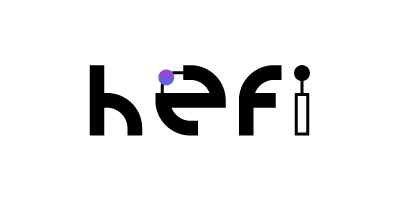About DAO
HeFi platform functions as a decentralized autonomous organization. Startups presented on the platform are also structured in the DAO format.


About the DAO
HeFi platform functions as a decentralized autonomous organization.
Startups presented on the platform are also structured in the DAO format
Startups presented on the platform are also structured in the DAO format

DAO
A form of organization where participants' activities are based on rules set in smart contracts, and any decisions are enforced only after the creation of vote and having quorum (the principle of consensus).
DAO Tokens
Token is a unit of accounting project assets, and an analogue of shares on the stock exchange. Tokens can only be used within the platform to purchase services, as a payment for the completed work. Token also entitles its owner to profit from the company going forward. The DAO participants decide on the further minting of the LP token.
Types of tokens:
Types of tokens:
- GT is a governance or native token that allows voting of its members. GT has no economic value, cannot be sent to another wallet like a regular token, and can only be created or sent as a result of voting in a DAO.
- LP token is an investment token or a liquidity provider token. This kind of token is backed by DAO assets and varying in price depending on the total issue of the LP and AUM of a DAO. Due to the fact that LP tokens are technically ordinary coins, they are credited directly to the wallet (for example, MetaMask or Trust). After crediting, tokens can be disposed of in any manner: stored, forwarded to other addresses, or invested.
Smart contract
A protocol that allows conducting transactions and controlling their completion using mathematical algorithms. Smart contracts are used to guarantee compliance with stipulated agreements in the correct algorithmic sequence. Smart contracts are meant to ensure compliance with agreements in the correct algorithmic sequence.
The algorithm is set inside the blockchain, as the rules for transactions and other manipulations cannot be changed. They are mandatory for all participants. Thus, smart contracts ensure the security of the transaction.
The algorithm is set inside the blockchain, as the rules for transactions and other manipulations cannot be changed. They are mandatory for all participants. Thus, smart contracts ensure the security of the transaction.
DAO
A form of organization where participants' activities are based on rules set in smart contracts, and any decisions are enforced only after the creation of vote and having quorum (the principle of consensus).
A form of organization where participants' activities are based on rules set in smart contracts, and any decisions are enforced only after the creation of vote and having quorum (the principle of consensus).
DAO Tokens
Token is a unit of accounting project assets, and an analogue of shares on the stock exchange. Tokens can only be used within the platform to purchase services, as a payment for the completed work. Token also entitles its owner to profit from the company going forward. The DAO participants decide on the further minting of the LP token.
Types of tokens:
GT is a governance or native token that allows voting of its members. GT has no economic value, cannot be sent to another wallet like a regular token, and can only be created or sent as a result of voting in a DAO.
LP token is an investment token or a liquidity provider token. This kind of token is backed by DAO assets and varying in price depending on the total issue of the LP and AUM of a DAO. Due to the fact that LP tokens are technically ordinary coins, they are credited directly to the wallet (for example, MetaMask or Trust). After crediting, tokens can be disposed of in any manner: stored, forwarded to other addresses, or invested.
Token is a unit of accounting project assets, and an analogue of shares on the stock exchange. Tokens can only be used within the platform to purchase services, as a payment for the completed work. Token also entitles its owner to profit from the company going forward. The DAO participants decide on the further minting of the LP token.
Types of tokens:
GT is a governance or native token that allows voting of its members. GT has no economic value, cannot be sent to another wallet like a regular token, and can only be created or sent as a result of voting in a DAO.
LP token is an investment token or a liquidity provider token. This kind of token is backed by DAO assets and varying in price depending on the total issue of the LP and AUM of a DAO. Due to the fact that LP tokens are technically ordinary coins, they are credited directly to the wallet (for example, MetaMask or Trust). After crediting, tokens can be disposed of in any manner: stored, forwarded to other addresses, or invested.
Smart contract
A protocol that allows conducting transactions and controlling their completion using mathematical algorithms. Smart contracts are used to guarantee compliance with stipulated agreements in the correct algorithmic sequence. Smart contracts are meant to ensure compliance with agreements in the correct algorithmic sequence.
The algorithm is set inside the blockchain, as the rules for transactions and other manipulations cannot be changed. They are mandatory for all participants. Thus, smart contracts ensure the security of the transaction.
A protocol that allows conducting transactions and controlling their completion using mathematical algorithms. Smart contracts are used to guarantee compliance with stipulated agreements in the correct algorithmic sequence. Smart contracts are meant to ensure compliance with agreements in the correct algorithmic sequence.
The algorithm is set inside the blockchain, as the rules for transactions and other manipulations cannot be changed. They are mandatory for all participants. Thus, smart contracts ensure the security of the transaction.

